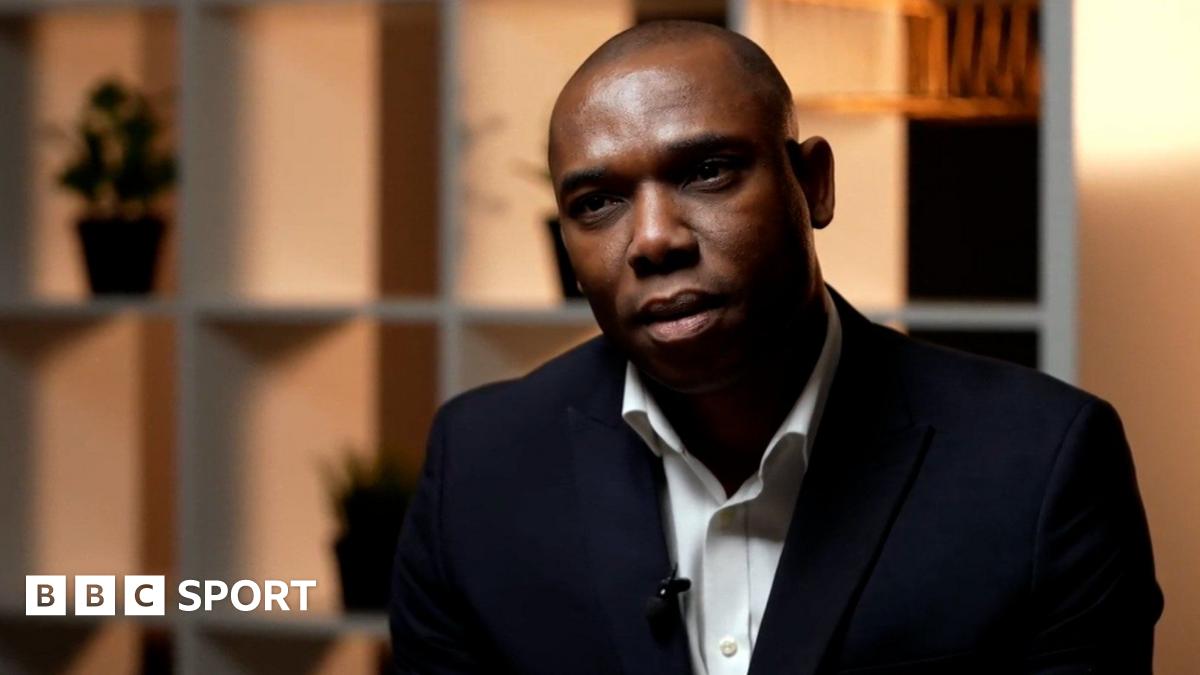This video can not be played
JavaScript must be enabled in your browser to play this video.
According to Kick It Out, the head of anti-discrimination, abuse in English football has “reached crisis point.”
Following a recent Women’s Super League game, Manchester City’s Khadija “Bunny” Shaw became the latest player to receive racist and misogynistic messages.
After being defeated by Arsenal, Shaw decided to withdraw from her club’s League Cup semi-final to protect her mental health from what Manchester City described as “disgusting treatment.”
“It is absolutely shocking, and that’s just one of a number of examples we see both online and in stadiums”, said Kick It Out (KIO) chief executive Samuel Okafor.
“We’re receiving those reports every week,” he said.
After receiving “appalling” racist abuse on Instagram, midfielder Joe Willock was recently urged by Newcastle United to do more.
Last month, Tamworth forward Chris Wreh also experienced racial abuse online.
In terms of discrimination and underrepresentation, Okafor hopes that new online safety regulations will help address the issue in what he sees as “a pivotal year for driving real change across the game.”
In the upcoming months, the Football Governance Bill, which will require clubs to disclose what steps they are taking to meet Equality, Diversity, and Inclusion (EDI) targets, is anticipated to become law.
This summer, the Football Association mandated that clubs publish workforce data for the first time, “a really big step toward transparency in the game,” according to Okafor.
‘ Totally unacceptable ‘ level of abuse
In the years 2023-2024, KIO received a record number of discrimination reports, with a rise in sexism, misogyny, and racism.
Across all levels of English football, there were 1, 332 incidents reported by the organisation – a 32% increase. Racism remained the most reported form of discrimination, with a 47% rise in abuse across all levels.
“These are footballers, but they’re]also] real human beings, and when you see the abuse that they face, it’s just totally unacceptable”, said Okafor.
“We did a research with 1, 500 women fans, and one in four still feel unsafe going to games. 52% said they experienced sexism within a stadium. Therefore, a lot of cultural work needs to be done to make the game more diverse.
” People are feeling more freedom to share their toxic and discriminatory abuse online, in particular. “
However, the 2023 Online Safety Act requires social media companies to demonstrate that they are removing illegal content and that they must do so by March 20. This will entail fines or enforcement measures.
” We believe that’s going to give the regulator more powers to be able to hold the social media firms to account, as well as providing better user-empowerment tools, “said Okafor.
” This is really important, because you can see the impact it has. This presents a fantastic opportunity to address that. It can be a real game changer. “
To the dismay of online hate speech campaigners, tech giant Meta announced recently that it is no longer using independent fact checkers on Facebook and Instagram.
” That really does trouble me, “said Okafor”. That actually makes the job more difficult.
Football needs to “catch up” on diversity data.
In an effort to combat racial inequality in the English game, the FA published a voluntary Diversity Code in 2020.
However, only 53 clubs signed up to provide data on their workforce annually, and collectively they failed to meet any of the eight recruitment targets.
The FA mandates that all professional clubs in the English game provide full diversity workforce data on age, sex, gender, ethnicity, disability, and sexual orientation by June despite the FA’s acknowledgment that progress has been “slower than hoped.”
“We’ve been calling for this for a number of years”, said Okafor.
It may make you uncomfortable, but other industries consistently do this, so football is just trying to catch up and bring the data to the light.
What happens when the data is released is the more crucial step.
“I’m really interested in seeing – do clubs reflect their communities? If they don’t, there’s an opportunity to ensure that they’ve got the relevant plans.
There is obviously no black coaches or South Asian representation in the sport, as you can see. There is a lack of diversity when it comes to match officials, in terms of boardrooms. “
According to Okafor, clubs that don’t publish the data should be subject to fines.
” We’re very hopeful that all the clubs will have published their data, “he added.
And if not, we’ll anticipate that there will be some sort of consequence as a result.
Related topics
- Football
Source: BBC

Leave a Reply